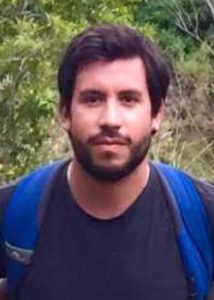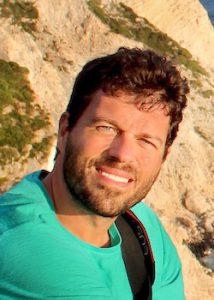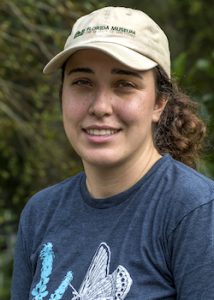The UF/IFAS School of Natural Resources and Environment (SNRE) recently announced the recipients of the Nadeau Graduate Research Award. The Robin E. Nadeau Fund established an endowment to support and promote research and education in the SNRE. The goal is to highlight the unique Interdisciplinary Ecology (IE) graduate program in natural resources and environmental sciences.
Each awardee, all of whom are doctoral students, will receive support for their research and educational programs. Funding can be used to pursue basic and applied research in interdisciplinary ecology:
- For travel to visit internationally recognized institutions to learn new techniques
- Participation in scientific meetings related to the applicant’s research
- To present research at national and international meetings
- To conduct research in the field for data collection.
The recipients of the 2022 Nadeau Graduate Research Award are:
Hernan Alvarez
 Hernan is using an interdisciplinary approach to understand non-compliance behaviors in the illegal wildlife trade in the Western Amazon of Ecuador. The success of natural resource conservation strategies strongly depends on people’s adherence to rules or norms to manage and conserve wildlife species. This is defined as compliance behaviors. Non-compliance can lead to the unsustainable and illegal trade of wildlife species. This represents one of the major wildlife crimes affecting ecosystems and jeopardizing local livelihoods. One approach to studying non-compliance behaviors is through understanding people’s perceptions of risk that could be amplified or attenuated in response to social interactions, situational, and socio-cultural factors.
Hernan is using an interdisciplinary approach to understand non-compliance behaviors in the illegal wildlife trade in the Western Amazon of Ecuador. The success of natural resource conservation strategies strongly depends on people’s adherence to rules or norms to manage and conserve wildlife species. This is defined as compliance behaviors. Non-compliance can lead to the unsustainable and illegal trade of wildlife species. This represents one of the major wildlife crimes affecting ecosystems and jeopardizing local livelihoods. One approach to studying non-compliance behaviors is through understanding people’s perceptions of risk that could be amplified or attenuated in response to social interactions, situational, and socio-cultural factors.
“With this study, I propose to explain how different factors influencing perceptions of risk, social-relational patterns between local actors, and situational and socio-cultural factors motivate people to not comply with wildlife trade regulations in the Ecuadorian Amazon,” he said.
Hernan plans to use a combination of quantitative and qualitative methods to better understand the general patterns of non-compliance and the underlying social processes that influence the illegal wildlife trade.
Ernesto Viveiros-de-Castro
 Ernesto is a Brazilian biologist and National Park manager who was inspired by the Appalachian Trail. In 2012, he proposed the implementation of the Atlantic Forest Trail (AFT), the first Brazilian mega trail. Working with the AFT generated his interest in other long-distance trails around the world. Specifically, knowing how they promote nature conservation, so he decided to return to academia to investigate this issue.
Ernesto is a Brazilian biologist and National Park manager who was inspired by the Appalachian Trail. In 2012, he proposed the implementation of the Atlantic Forest Trail (AFT), the first Brazilian mega trail. Working with the AFT generated his interest in other long-distance trails around the world. Specifically, knowing how they promote nature conservation, so he decided to return to academia to investigate this issue.
Ernesto’s interdisciplinary research is titled “The contribution of long-distance trails to nature conservation: connecting hikers, communities, and landscapes.” It integrates ecological, economic, and social approaches to fill this gap and understand at what level long-distance trails are a valid strategy for promoting nature conservation and guide the implementation of trails in Brazil.
“After completing my Ph.D., I intend to apply that knowledge to the implementation of the AFT,” he said. “It should also benefit the management of Brazilian protected areas.”
David Klinges
 David is interested in understanding where, when, and why climate change or land-use change is a greater threat to biodiversity and natural resources. He uses a combination of geospatial tools, high-powered computing, and on-the-ground data collection to map and model from local to global scales. His research program currently centers upon two primary projects: using mechanistic microclimate modeling to understand spatiotemporal drivers of microclimate globally and exploring how human modification of forested landscapes in Madagascar shapes near-surface temperature as well as amphibian diversity and distributions.
David is interested in understanding where, when, and why climate change or land-use change is a greater threat to biodiversity and natural resources. He uses a combination of geospatial tools, high-powered computing, and on-the-ground data collection to map and model from local to global scales. His research program currently centers upon two primary projects: using mechanistic microclimate modeling to understand spatiotemporal drivers of microclimate globally and exploring how human modification of forested landscapes in Madagascar shapes near-surface temperature as well as amphibian diversity and distributions.
“Through this work, I hope to expand fundamental knowledge of ecoclimatic relationships, while integrating academic insights into real-world conservation,” David said.
Sarah Steele Cabrera
 “My research is driven by a dedication to the field of biological conservation and ecology,” Steele Cabrera said. “My work focuses on the conservation of insects, due to the critical role that insects play in many ecosystem functions, including pollination and nutrient cycling, and as a major food source for organisms in higher trophic levels.”
“My research is driven by a dedication to the field of biological conservation and ecology,” Steele Cabrera said. “My work focuses on the conservation of insects, due to the critical role that insects play in many ecosystem functions, including pollination and nutrient cycling, and as a major food source for organisms in higher trophic levels.”
Sarah utilizes butterflies as study organisms because they are well-known and easily identifiable in the field. In addition, they are ecologically important. There are over two dozen species of butterfly listed as threatened or endangered in the United States. Her research is immediately applicable to the conservation of these and other insects.
“The goal of my Ph.D. research is to better understand ecological, genetic, and climate factors that impact insect conservation,” Sarah said.
Upon the conclusion of their research, each awardee will present findings at the SNRE Annual Research Symposium.
The award honors Robin E. Nadeau, a resident of St. Augustine who championed conservation efforts. She died in January 2012. Her estate donated a gift to the UF Foundation, which established this award.
 1
1
